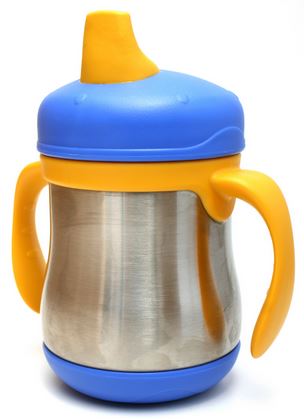SLP Corner: Step Away From the Sippy Cup!
by Melanie Potock MA, CCC-SLP
Sippy Cups became all the rage in the 1980s, along with oversized shoulder pads, MC Hammer parachute pants and bangs that stood up like a water spout on top of your head. A mechanical engineer, tired of his toddler’s trail of juice throughout the house, set out to create a spill-proof cup that would “outsmart the child.” Soon, Playtex® offered a licensing deal, the rest is history and I suspect that mechanical engineer is now comfortably retired and living in a sippy-cup mansion on a tropical island in the South Pacific.
Geez. Why didn’t I invent something like that? I want to live in a mansion in the South Pacific. By the way, I also missed the boat on sticky notes, Velcro® and Duct Tape®–all products I encounter on a daily basis, just like those darn sippy cups I see everywhere. I truly shouldn’t be so bitter, though – in my professional opinion, over-use of sippy cups is keeping me employed as a feeding specialist and I should be thankful for job security. Thank goodness for the American marketing machine – it has convinced today’s generation of parents that transitioning from breast or bottle to the sippy cup is part of the developmental process of eating. Problem is, those sippy cups seem to linger through preschool.
As an SLP who treats babies with feeding challenges, I frequently hear from parents how excited they are to begin teaching their baby to use a sippy cup. They often view it as a developmental milestone, when in fact it was invented simply to keep the floor clean and was never designed for developing oral motor skills. Sippy cups were invented for parents, not for kids. The next transition from breast and/or
Read the Rest of this Article on ASHAsphere
PediaStaff is Hiring!
All JobsPediaStaff hires pediatric and school-based professionals nationwide for contract assignments of 2 to 12 months. We also help clinics, hospitals, schools, and home health agencies to find and hire these professionals directly. We work with Speech-Language Pathologists, Occupational and Physical Therapists, School Psychologists, and others in pediatric therapy and education.

